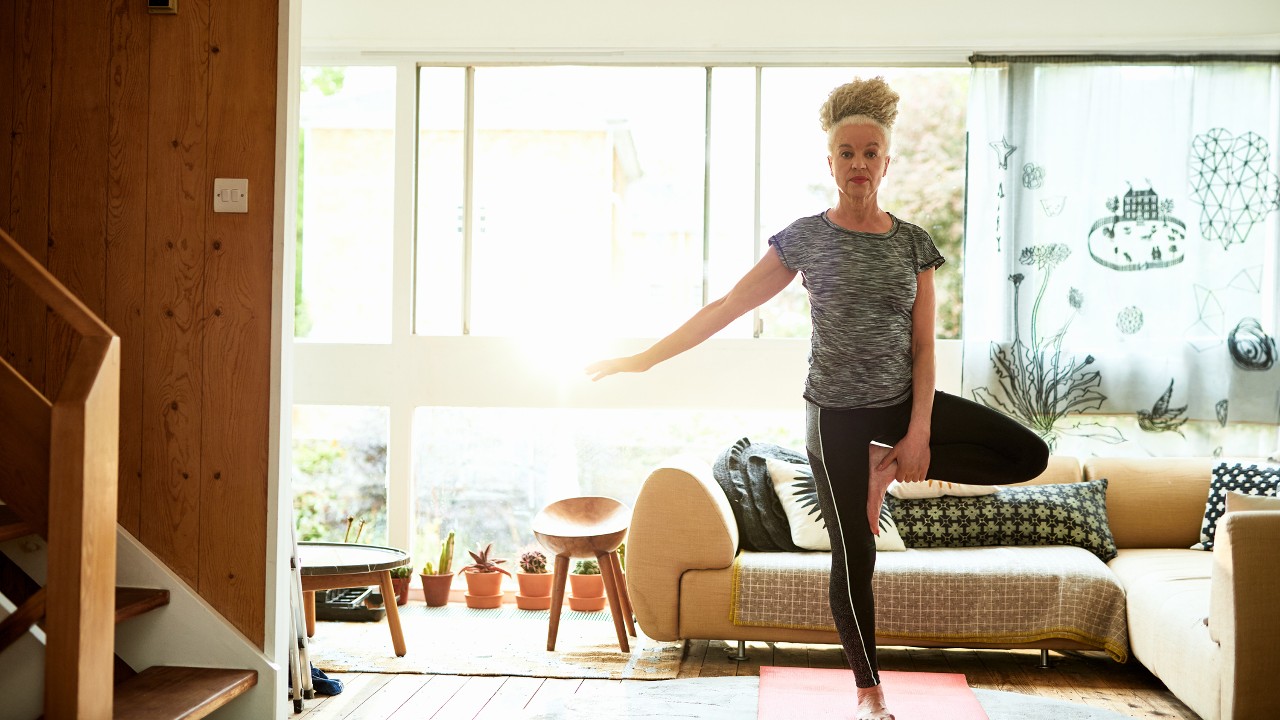The Science Is Really Clear About How To Reduce Your Chances Of Catching A Cold
It’s just a bit of exercise every day, and you may be surprised by how little you have to do to see the benefit

Sign up for workout ideas, training advice, reviews of the latest gear and more.
You are now subscribed
Your newsletter sign-up was successful
Cold and flu season is upon us, and unfortunately there’s no way to ensure an entirely sniffle-free winter, but that doesn’t mean we can’t take steps to give our immune system the best chance of fighting off bugs. We’ve previously sought advice from a dietitian about how to strengthen your immune system through your diet, but that’s not all you can do.
We spoke to immunologist Dr Jenna Macciochi about why regular moderate exercise can help reduce the risk of catching the common cold, improve mood and reduce stress. Macchiochi is working with Actimel on a campaign to encourage daily movement.

Jenna Macchiochi is a senior lecturer in immunology and researcher at the University of Sussex, as well as an editor of the Annals Of Advanced Biomedical Sciences. She holds a BSc in immunology from the University of Glasgow and a PhD in immunology from Imperial College London. She has also written two books, Immunity: The Science Of Staying Well and Your Blueprint For Strong Immunity.
What effect does exercise have on the immune system?
People who are physically active have a lower risk of infection, and a reduced risk of certain inflammatory diseases and some cancers. There’s evidence that exercise can act therapeutically and benefit those with conditions that affect their immune systems, such as inflammatory diseases.
How does exercise produce this effect?
Any kind of exercise gets your lymphatic fluid flowing and that’s where many of your immune cells are. This allows the white blood cells to circulate around the body better and perform a surveillance function.
A single session of exercise can lead to inflammation, but this in turn promotes an overall an anti-inflammatory response.
Regular exercise also helps us to maintain a healthy bodyweight and muscle mass, which are known to be important to the immune system, as well as relieving stress which has an indirect effect on overall wellbeing and immunity.
Are there many studies that show this effect?
There’s a really robust body of evidence that shows this over a long period of time, with lots of human studies and meta-analysis showing that when people exercise frequently, they have less chance of catching a cold in the winter or suffering from infection.
For example, a one-year study of over 500 adults found that participating in one to two hours of moderate exercise per day was associated with a one-third reduction in the risk of getting an upper respiratory tract infection compared with individuals who had an inactive lifestyle.
Other studies have shown that people who exercise on two or more days a week have half as many days off school or work due to colds or flu as those who don’t exercise.
A more recent study demonstrated that exercise in the form of small frequent sessions of simple strengthening exercises can reduce sickness absence. This comes from a study of 70,000 employees in Denmark. Participants carried out 10 to 15 minutes of micro-exercise with elastic resistance bands performed three times a week during work hours. After adjusting for factors such as age, education and sex, the researchers concluded that these micro-exercises reduced illness by 12.8%.
What type of exercise is best for immune system response?
Cardiovascular trained individuals tend to improve immune regulation, delaying the onset of age-related immune decline. This means that even when they’re older their immune system functions as though it’s much younger. We know this from a study of hundreds of 70-year-old cyclists.
Resistance exercise is also important because it helps us to hold on to muscle mass as we age. Muscle sends a signal to our immune system to keep it young and working properly. We naturally lose muscle mass as we age and that’s going to be exacerbated if we don’t do strengthening exercises regularly.
How much exercise is needed to see an improvement?
The main message is that any exercise is better than none. If you’re very inactive, you’ll start to see the benefits quite quickly. If you’re already very active throughout the day then you won’t necessarily see benefits from adding more exercise, but staying active will help to maintain the function of your immune system.
It’s about moving more, moving more often and moving in lots of different ways. Unfortunately, many people’s days tend to be quite sedentary, and it’s important to make the distinction between someone who’s inactive and not meeting the minimum government guidelines and someone who might regularly meet the requirements, but is otherwise sedentary. So that might be someone who sits for long periods of time at their desk and then goes to the gym and does a one-hour HIIT class.
What we know from the scientific research is that sedentary time is quite damaging for our health, particularly our immune system, and it can’t be undone by a one-hour workout – we need to break up sitting time during the day.
Ideally everyone should be trying to meet the government guidelines, unless there’s a specific reason why they can’t. This includes at least 150 minutes of moderate activity a week, such as walking, cycling, dancing or tennis, or 75 minutes of vigorous activity, including running, swimming, team sports or circuit training.
This also includes two sessions of muscle-strengthening exercises a week. Resistance training is something that’s long played second fiddle to cardiovascular exercise – we often think that we should be doing something that makes us sweat, but less frequently think about resistance exercise. It doesn’t have to be going to the gym and lifting weights – it could be bodyweight exercise, Pilates, yoga, heavy housework or just picking up your kids. We have 600 or more muscles in the human body and we need to engage all of them to be well and maintain a well-functioning immune system.

Can too much exercise impair the immune system response?
Yes. This can be shown on a graph with a J-shaped curve. So, starting at one side, if you’re inactive your risk of infections and poor health is high, then as you move into the middle of the graph, it reduces with moderate exercise, but then it starts to increase again if you’re under a heavy training load.
Athletes or people who are training excessively for sporting events can end up with a suppressed immune system once the training load exceeds what your body can cope with. This level will be different for everyone, but is tied to the dose, duration and frequency. For example, sessions that last longer than 90 minutes can lead to a suppression of the immune system over the next 24 hours. If people are doing this frequently, we see that they quickly become more susceptible to infections.
What are your top tips for a strong immune system response during the cold and flu season?
I like to think of the Swiss cheese model where each different action is going to provide a layer of protection against infection, but it isn’t going to make you invincible. In layers of Swiss cheese there are holes in each slice, but when you layer them together, they overlap and fortify by filling the gaps.
Areas to consider include a healthy balanced diet including plenty of plant foods, regular daily movement and different types of physical activity, getting to sleep at a regular time and improving your sleep quality, and working to reduce your stress levels.
With these foundations in place, think about supplementing with vitamin D, which we should all be taking at this time of year. We can get this through fortified foods such as Actimel.
Actimel contains vitamin D and B6, which helps support the normal function of the immune system when consumed as part of a balanced diet and healthy lifestyle.
Sign up for workout ideas, training advice, reviews of the latest gear and more.

Sarah is an experienced health, fitness, nutrition and beauty writer, and was previously health editor at BBC Good Food. She has contributed reviews, interviews and features to Coach since 2019, covering exercise bikes, fitness trackers and apps, among other topics. In her free time, she can be found hiking, swimming, cycling or trying (and failing) to do a headstand on a yoga mat.
